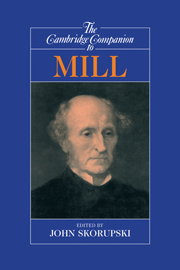Book contents
- Frontmatter
- Introduction
- 1 Mill on language and logic
- 2 Mill, mathematics, and the naturalist tradition
- 3 Mill on induction and scientific method
- 4 Mill, phenomenalism, and the self
- 5 Mill on religion
- 6 Mill on psychology and the moral sciences
- 7 Mill's utilitarianism
- 8 Mill's political economy
- 9 Civilization and culture as moral concepts
- 10 Democracy, socialism, and the working classes
- 11 The subjection of women
- 12 Mill and the Classical world
- 13 The reception and early reputation of Mill's political thought
- 14 Mill in a liberal landscape
- Guide to further reading
- Bibliography
- Index
13 - The reception and early reputation of Mill's political thought
Published online by Cambridge University Press: 28 May 2006
- Frontmatter
- Introduction
- 1 Mill on language and logic
- 2 Mill, mathematics, and the naturalist tradition
- 3 Mill on induction and scientific method
- 4 Mill, phenomenalism, and the self
- 5 Mill on religion
- 6 Mill on psychology and the moral sciences
- 7 Mill's utilitarianism
- 8 Mill's political economy
- 9 Civilization and culture as moral concepts
- 10 Democracy, socialism, and the working classes
- 11 The subjection of women
- 12 Mill and the Classical world
- 13 The reception and early reputation of Mill's political thought
- 14 Mill in a liberal landscape
- Guide to further reading
- Bibliography
- Index
Summary
INTRODUCTION
Mill would have found it entirely appropriate that, in a collection on his philosophy, attention should be paid to his political writings and to their reception, which itself had a strong political dimension. Mill saw his political ideas as an integral part of his philosophy, and his philosophical battles as also political battles whose outcome had great practical importance. He stated this explicitly in his Autobiography in the survey of his aims in writing his principal philosophical books, A System of Logic and An Examination of Sir William Hamilton's Philosophy. He thought it crucial to set out in the Logic the true philosophy, deriving all knowledge from experience, because it was “hardly possible to exaggerate” the practical mischiefs done in morals, politics, and religion by the false philosophy that “truths external to the mind may be known by intuition or consciousness, independently of observation and experience”. The latter was “the great intellectual support of false doctrines and bad institutions” because it allowed “every inveterate belief and every intense feeling, of which the origin is not remembered... to dispense with the obligation of justifying itself by reason....” “There never was”, Mill concludes, “such an instrument devised for consecrating all deep seated prejudices.”
- Type
- Chapter
- Information
- The Cambridge Companion to Mill , pp. 464 - 496Publisher: Cambridge University PressPrint publication year: 1998
- 10
- Cited by



